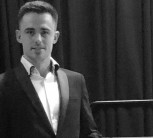Research by an international team of scientists led by the University of Pretoria’s (UP) Dr Jack Radcliffe has clarified the eating habits of massive black holes.
(c) ESA/C. Carreau
April 30, 2021

Dr Jack Radcliffe obtained a BSc degree and a master’s in Physics from Imperial College London in the UK (2010 to 2014). He went on to obtain a PhD in Astrophysics (2014 to 2019) jointly from the University of Manchester in the UK and the University of Groningen in the Netherlands.
Dr Radcliffe moved to South Africa in July 2019 to take up a postdoctoral appointment at the University of Pretoria (UP); the appointment was funded by the South African Radio Astronomy Observatory. In June 2021, he took up a permanent position as a lecturer at UP and as an honorary research fellow at the University of Manchester.
His research at UP has to do with the world-leading radio telescope MeerKAT, which South Africa developed and which will eventually transition into the Square Kilometre Array (SKA). This will be funded by 14 countries and will be one of the largest astronomy projects ever undertaken.
“It will revolutionise our understanding of many diverse areas of astrophysics,” Dr Radcliffe says. “In light of this, UP has undertaken an ambitious programme to build a research group, founded in 2018, that now comprises over 20 members.
“UP has decided to focus on a synergy between MeerKAT and other observatories through a technique called very long baseline interferometry (VLBI). This aligns well with my research. This is the same technique that has produced the two black hole images that propelled the UP astronomy group to world recognition. This growing national and global reputation of the University within the field of astronomy made doing research here an attractive prospect.”
Dr Radcliffe explains his long-held fascination with astronomy.
“Astronomy has always inspired awe and fascination, and has been influential in the time-old questions of why we are here and how we came to be. Astronomy could be thought of as ‘blue skies’ research, where seemingly billions of rands are injected into something without a real-world application. While this could draw anger from the public, the exacting standards that our instruments and rigorous analysis need to achieve our scientific goals mean that many offshoots and real-world applications are often borne from our research. The archetypal example of radio astronomy comes from Australia, where researchers at the Australian Commonwealth Scientific and Research Organisation developed the technology that was needed for WiFi to become possible.”
Dr Radcliffe is part of the astronomy group at UP and leads a sub-group that focuses on using VLBI to find and characterise the massive black holes within galaxies across the age of the universe. The group has active collaborations with many institutes across multiple continents.
“My own research at the moment involves technical aspects, such as how to make telescopes work better and more efficiently, and some scientific projects regarding how galaxies and their central supermassive black holes evolve over time.
“The astronomy group has been closely aligned with the Computational Intelligence Research Group (CIRG) within the Department of Computer Science at UP. The MeerKAT and SKA telescopes are making vast amounts of data that require intelligent solutions and cutting-edge algorithms to analyse. In particular, the use of machine learning and artificial intelligence technologies can assist here, hence the collaboration between the astronomy group and CIRG.”
A recent highlight for Dr Radcliffe was recognition the team received for their research on the eating habits of black holes in galaxies. They found that supermassive black holes have varying appetites and can consume a small or large amount of matter. It was featured on both national and international news stations.
Over the past 18 months, his research direction has changed to focus on the SKA. “In particular, I have focused on simulating how the telescope will operate. This will provide us with a way to test that the various systems are working properly, and we can extract science from day one, rather than finding out about issues later down the line.”
Dr Radcliffe says he found his way into academia to understand the unknown, and his dream is to make a lasting impact on our understanding of the cosmos.
“One of the big unsolved mysteries in astronomy at the moment is exactly how galaxies evolved to make the universe that we see today,” he says. “Every one of these galaxies have a supermassive black hole at the centre, and studies have shown that these grow with the galaxies and the stars within the galaxy. However, we are still unsure whether black holes influence the number of stars born and what mechanism causes this feedback loop. One of the main theories is that black holes emit streams of fast-moving particles (radio jets) that agitate the gas and so produce more stars. These streams of fast-moving particles are bright radio waves. I use telescopes to observe these radio waves to see how many black holes are emitting these streams of particles and their subsequent effect on the stars in the galaxies. This allows us to constrain theories of galaxy evolution and further our understanding of this process.”
Dr Radcliffe’s message to South African students in particular is that the future is very bright in astronomy.
“There are truly world-class facilities here, and these are only going to improve in the future with the advent of the SKA. South Africans can be expected to make a large proportion of amazing new discoveries in the future. For those who are undecided or would prefer to stay in industry, the skills that you get from doing an astronomy- or physics-related degree are highly attractive to many different industries. These skills include programming, problem-solving, statistics, high-performance computing and machine learning. In the modern age, almost every sector has a need for these sorts of skills.”
In his spare time, Dr Radcliffe is an avid player of many kinds of sport, including tennis, snooker, squash and golf. However, this has been curtailed by the recent arrival of his first-born, Archie.
 Story
Story
Generative artificial intelligence (GenAI) is changing how we work, play and relax. Whether you use ChatGPT to write a brief, Midjourney to generate visuals or MuseNet to create unique soundtracks, these technologies have opened up opportunities for richer content.
 Story
Story
A single query to ChatGPT uses as much electricity as burning a light bulb for about 20 minutes. Multiply that by the millions of requests that this artificial intelligence (AI) chatbot receives each day, and the environmental impact is ominous.
 Story
Story
Researchers at the University of Pretoria (UP) may have identified the gene that is responsible for diet-related obesity. By exploring the role of the novel gene Slc7a8, they have made a potential breakthrough in current knowledge about the cellular mechanisms that drive fat accumulation. This understanding is crucial in developing effective treatments.
Copyright © University of Pretoria 2025. All rights reserved.
Get Social With Us
Download the UP Mobile App